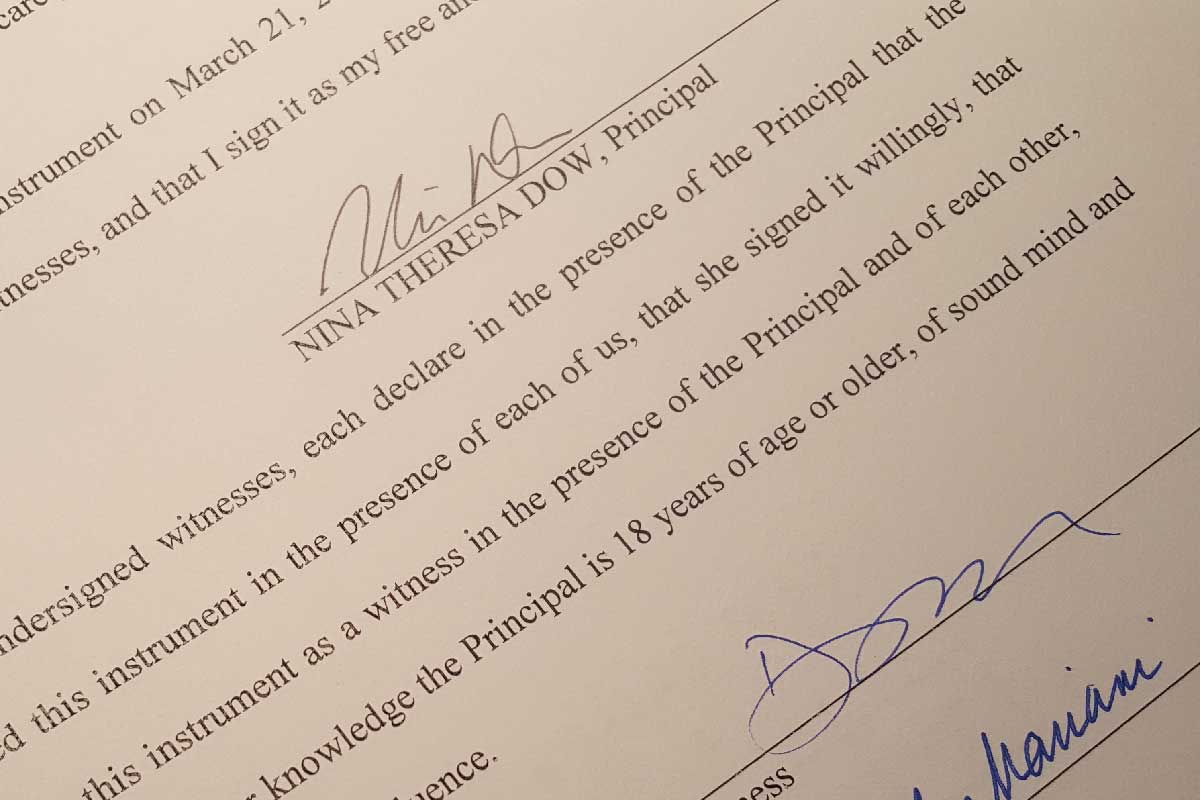April 16 is National Healthcare Decision Day, kicking off a week of awareness for advanced health care planning. There’s no better time to execute a health care proxy, if you don’t yet have one. I’ve just followed my own advice and taken this important step. You can see the proof in the picture.
Why bother to have a health care proxy? Consider the case of Emily and Kumail in the popular 2017 film, The Big Sick, a comedy based on a true story, which includes a scene about a health care proxy that is anything but funny.
Emily, a graduate student played by Zoe Kazan, falls seriously ill while away from home, on the heels of her break-up with Kumail (played by actor-comedian Kumail Nanjiani). Kumail hears of her illness and rushes to her side, only to be met by a stoic emergency room doctor holding a clipboard.
The doctor explains that Emily must be placed in an induced coma to receive life-saving surgery. That drastic step requires Emily’s written consent, but she is unconscious. “Are you her husband?” he asks Kumail. Stunned and conflicted, Kumail reluctantly signs his name.
Imagine how Kumail felt. If he doesn’t sign, Emily could die. If he does sign, he not only puts her into a coma, but he also commits fraud! Kumail, or anyone in his place, would have felt considerably better about consenting (or not consenting) to medical treatment had he known Emily’s wishes, and had she authorized him to make her treatment decisions. (In fact, this story draws on Kumail’s true life experience with his real wife, Emily, with whom he co-wrote the screenplay.)
Health Care Proxies Shouldn’t Be an Afterthought
Health care proxies serve two purposes. They provide consent on behalf of someone who is unable to make a health care decision, and they relieve the person acting on her behalf to know “she would have wanted this.” If a health care proxy is not in place when a medical decision must be made, then the patient’s family or friend must file a legal proceeding in a Probate and Family Court—a costly result in terms of time and money.
Don’t assume that only the old and infirm need health care proxies. The Big Sick illustrates why young people need health care proxies, too. If you are a parent, understand that your college-age child who is at least 18 years old is a legal adult. With that status, your adult child gains confidentiality with respect to medical records and autonomy with respect to medical treatment. You have no legal right to see the records or to decide on treatment. Should your child have a medical emergency while travelling or on spring break, this could be a serious issue. That’s why it’s a good idea to have your young adult child execute a health care proxy.
What’s a Health Care Proxy?
A health care proxy is a document signed by a person (legally called the Principal) who is competent to appoint another person (legally called the Agent) to make health care decisions on behalf of the Principal. Under Massachusetts law, a health care proxy can go a step further by providing for advance directives (decisions with respect to life-sustaining treatment).
A health care proxy is the only document recognized in Massachusetts that enables a person to express his or her instructions regarding medical treatment and advance directives in the event that he or she becomes unable to communicate personal decisions with respect to medical treatment.
I like to think that health care proxies are flexible documents. While the Principal is competent, the health care proxy is dormant or “sleeping” and cannot be used by the Agent. If the Principal becomes incompetent, the health care proxy becomes active, and the Agent may step in to make decisions on the Principal’s behalf. What happens if the Principal regains competency? The health care proxy goes back to sleep.
How It’s Done
Massachusetts law requires a person signing a health care proxy to be of sound mind and age 18 or older. He or she must sign the legal document in the presence of two witnesses. It is also good practice to notarize the health care proxy, as well.
Clients ask many questions before a health care proxy is in place:
- Whom should I choose as an agent?
- How does a health care proxy fit into my overall estate plan?
- How is my confidential medical information released and to whom?
- What do I do with my proxy after it is executed?
We would be happy to answer all your questions about health care proxies and to help you draft yours.

